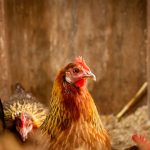Chickens have specific requirements for optimal health and well-being, particularly during winter. Essential needs include warmth, shelter from harsh weather, and consistent access to food and water. Winter poses unique challenges for chickens, increasing their susceptibility to illness and stress.
Providing a safe, comfortable environment is crucial for maintaining flock health throughout the cold season. Chickens possess natural adaptations for cold weather, including insulating feathers and an instinct to huddle for warmth. However, extreme temperatures can still be detrimental to their health.
Cold tolerance varies among chicken breeds, with some being more resilient than others. Factors such as age, health status, and overall condition also influence a chicken’s ability to withstand cold temperatures. Understanding the specific needs of chickens in winter enables caretakers to implement appropriate measures for ensuring flock health and comfort during colder months.
This knowledge is essential for successful chicken husbandry in regions experiencing significant seasonal temperature variations.
Table of Contents
- 1 The importance of providing warmth for chickens
- 2 Ways to keep chickens warm in winter
- 3 Signs of cold stress in chickens
- 4 Risks of not providing adequate warmth for chickens
- 5 Tips for maintaining a healthy coop environment in winter
- 6 Consulting with a veterinarian for winter care advice
- 7 FAQs
- 7.1 What temperature can chickens tolerate in winter?
- 7.2 Do chickens need supplemental heat in winter?
- 7.3 What are the risks of using heat lamps or other supplemental heat sources for chickens?
- 7.4 How can I help my chickens stay warm in winter?
- 7.5 Are there any specific breeds of chickens that are better suited for cold climates?
Key Takeaways
- Chickens need extra care in winter due to their susceptibility to cold temperatures and drafts
- Providing warmth for chickens is crucial for their health and well-being during winter
- Ways to keep chickens warm in winter include using heat lamps, insulating the coop, and providing extra bedding
- Signs of cold stress in chickens include shivering, reduced egg production, and pale combs and wattles
- Not providing adequate warmth for chickens can lead to health issues, decreased egg production, and even death
- Tips for maintaining a healthy coop environment in winter include proper ventilation, preventing moisture buildup, and providing a balanced diet
- Consulting with a veterinarian can provide valuable advice on winter care for chickens
The importance of providing warmth for chickens
Physical Health Benefits
Additionally, cold stress can lead to a decrease in egg production and overall productivity in your flock. By providing warmth for your chickens, you can help them stay healthy, comfortable, and productive throughout the winter months.
Mental and Emotional Well-being
Chickens are social animals that thrive in a comfortable and secure environment. By ensuring that they have access to warmth and shelter, you can help reduce their stress levels and promote a sense of security within the flock. This can lead to improved behavior, reduced aggression, and overall better social dynamics among your chickens.
Overall Importance
Ultimately, providing warmth for your chickens is not only important for their physical health but also for their mental and emotional well-being.
Ways to keep chickens warm in winter

There are several effective ways to keep chickens warm during the winter months. One of the most important factors is providing adequate shelter. A well-insulated coop with proper ventilation is essential for keeping chickens warm and dry.
Insulating the walls and roof of the coop can help retain heat, while ensuring that there is enough ventilation will prevent moisture buildup and maintain air quality. Additionally, providing plenty of bedding such as straw or wood shavings can help insulate the coop and provide a comfortable surface for the chickens to rest on. Another effective way to keep chickens warm in winter is by using heat sources such as heat lamps or heated pads.
These can be placed in strategic locations within the coop to provide additional warmth during particularly cold nights. It’s important to use caution when using heat sources, as they can pose a fire hazard if not used properly. Additionally, providing a warm and nutritious diet can help keep chickens warm from the inside out.
Feeding them high-energy foods such as cracked corn or sunflower seeds can help boost their metabolism and generate heat from within.
Signs of cold stress in chickens
It’s important for chicken owners to be able to recognize the signs of cold stress in their flock so that they can take appropriate action to address the issue. Some common signs of cold stress in chickens include shivering, huddling together for warmth, decreased activity, pale combs and wattles, reduced egg production, and in severe cases, frostbite. If you notice any of these signs in your chickens, it’s important to take immediate steps to provide them with additional warmth and protection from the cold.
In addition to physical signs of cold stress, it’s also important to pay attention to the behavior of your chickens. Cold-stressed chickens may exhibit signs of distress such as increased aggression, decreased social interaction, or lethargy. By being observant and attentive to the behavior and appearance of your flock, you can identify signs of cold stress early on and take proactive measures to ensure their well-being.
Risks of not providing adequate warmth for chickens
Failing to provide adequate warmth for chickens during the winter months can pose serious risks to their health and well-being. Cold stress can lead to a range of health issues including frostbite, hypothermia, respiratory infections, and decreased immune function. In severe cases, untreated cold stress can even result in death.
Additionally, cold-stressed chickens are more likely to experience a decrease in egg production and overall productivity, which can have financial implications for chicken owners. Beyond the immediate health risks, not providing adequate warmth for chickens can also impact their long-term well-being. Cold-stressed chickens may experience increased stress levels, which can lead to behavioral issues such as aggression or reduced social interaction within the flock.
By failing to provide warmth for your chickens, you not only put their physical health at risk but also compromise their mental and emotional well-being.
Tips for maintaining a healthy coop environment in winter

Insulation and Draft Prevention
One important tip is to ensure that the coop is well-insulated and free from drafts. Insulating the walls and roof of the coop can help retain heat, while sealing any gaps or cracks can prevent drafts from entering the coop.
Ventilation and Air Quality
Additionally, providing proper ventilation is crucial for maintaining air quality and preventing moisture buildup, which can lead to respiratory issues in chickens.
Bedding and Cleanliness
Another tip for maintaining a healthy coop environment in winter is to provide plenty of bedding for the chickens. Bedding such as straw or wood shavings can help insulate the coop and provide a comfortable surface for the chickens to rest on. Regularly cleaning and replacing soiled bedding is important for maintaining cleanliness and preventing the buildup of moisture and ammonia.
Consulting with a veterinarian for winter care advice
Consulting with a veterinarian is an important step in ensuring the health and well-being of your chickens during the winter months. A veterinarian can provide valuable advice on how to keep your flock warm and healthy during cold weather, as well as offer guidance on identifying and addressing signs of cold stress or illness in your chickens. Additionally, a veterinarian can provide recommendations on nutrition, supplements, and other measures that can help support the overall health of your flock during the winter.
In addition to seeking advice from a veterinarian, it’s also important to stay informed about best practices for winter care through reputable sources such as poultry organizations or agricultural extension services. By staying educated and proactive about winter care for your chickens, you can help ensure that they remain healthy and comfortable throughout the colder months.
If you’re wondering whether you need to keep your chickens warm in winter, you may also be interested in learning about the best flooring for your chicken coop. Check out this article for tips on creating a comfortable and safe environment for your feathered friends.
FAQs
What temperature can chickens tolerate in winter?
Chickens are able to tolerate cold temperatures quite well, as long as they are dry and out of drafts. They can handle temperatures as low as 0°F (-18°C) as long as they have proper shelter and access to food and water.
Do chickens need supplemental heat in winter?
In most cases, chickens do not need supplemental heat in winter. Their feathers provide insulation, and they are able to generate body heat by huddling together. Providing a well-ventilated, draft-free coop with plenty of bedding is usually sufficient.
What are the risks of using heat lamps or other supplemental heat sources for chickens?
Using heat lamps or other supplemental heat sources in a chicken coop can pose fire hazards due to the flammable nature of bedding and feathers. Additionally, chickens can become dependent on the heat source, making it difficult for them to acclimate to cold temperatures.
How can I help my chickens stay warm in winter?
To help chickens stay warm in winter, provide a well-insulated and draft-free coop with plenty of dry bedding. Ensure that the coop is well-ventilated to prevent moisture buildup, and provide access to fresh water and a balanced diet to help them generate body heat.
Are there any specific breeds of chickens that are better suited for cold climates?
Some chicken breeds are better suited for cold climates due to their cold-hardy characteristics. Breeds such as the Plymouth Rock, Orpington, and Wyandotte are known for their ability to tolerate cold temperatures and continue laying eggs throughout the winter.
Meet Walter, the feathered-friend fanatic of Florida! Nestled in the sunshine state, Walter struts through life with his feathered companions, clucking his way to happiness. With a coop that’s fancier than a five-star hotel, he’s the Don Juan of the chicken world. When he’s not teaching his hens to do the cha-cha, you’ll find him in a heated debate with his prized rooster, Sir Clucks-a-Lot. Walter’s poultry passion is no yolk; he’s the sunny-side-up guy you never knew you needed in your flock of friends!







